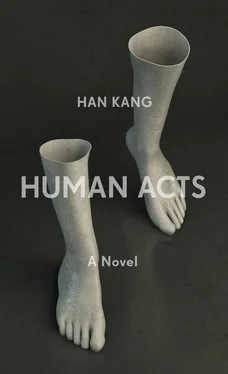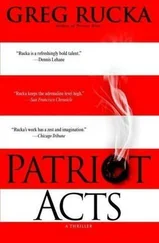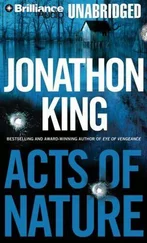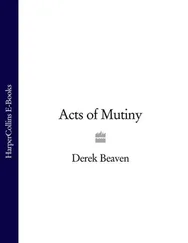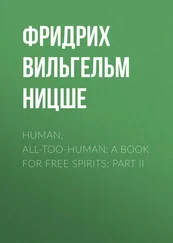Han Kang - Human Acts
Здесь есть возможность читать онлайн «Han Kang - Human Acts» весь текст электронной книги совершенно бесплатно (целиком полную версию без сокращений). В некоторых случаях можно слушать аудио, скачать через торрент в формате fb2 и присутствует краткое содержание. Год выпуска: 2016, Издательство: Portobello Books, Жанр: Современная проза, на английском языке. Описание произведения, (предисловие) а так же отзывы посетителей доступны на портале библиотеки ЛибКат.
- Название:Human Acts
- Автор:
- Издательство:Portobello Books
- Жанр:
- Год:2016
- ISBN:нет данных
- Рейтинг книги:4 / 5. Голосов: 1
-
Избранное:Добавить в избранное
- Отзывы:
-
Ваша оценка:
- 80
- 1
- 2
- 3
- 4
- 5
Human Acts: краткое содержание, описание и аннотация
Предлагаем к чтению аннотацию, описание, краткое содержание или предисловие (зависит от того, что написал сам автор книги «Human Acts»). Если вы не нашли необходимую информацию о книге — напишите в комментариях, мы постараемся отыскать её.
Human Acts
Human Acts — читать онлайн бесплатно полную книгу (весь текст) целиком
Ниже представлен текст книги, разбитый по страницам. Система сохранения места последней прочитанной страницы, позволяет с удобством читать онлайн бесплатно книгу «Human Acts», без необходимости каждый раз заново искать на чём Вы остановились. Поставьте закладку, и сможете в любой момент перейти на страницу, на которой закончили чтение.
Интервал:
Закладка:
‘There was a young woman … She was waiting for her husband outside their house. Not long before her due date. They shot her in the middle of the head. She died instantly.’
In my impressionable child’s imagination, I saw a woman in her twenties standing in front of our old hanok’s main gate, her hands on her round stomach. A bullet hole opened up in the centre of her pale forehead. Wide as a surprised eye.
Two summers on, my father brought the photo chapbook home.
He’d been down to Gwangju on a condolence call, and had picked it up at the train station — they were relatively common at the time, though printed in secret and sold unofficially. Once the grown-ups had finished passing the book round, the silence that ensued was heavy as lead. Father put it away in the bookcase, up on the highest shelf so we children wouldn’t accidentally come across it. He even slid it in back-to-front, so that the spine wasn’t visible.
At night, though, when the grown-ups were all sitting in the kitchen and I knew I’d be safe at least until the end of the nine o’clock news, I crept into the main room in search of that book. I scanned every spine until finally I got to the top shelf; I still remember the moment when my gaze fell upon the mutilated face of a young woman, her features slashed through with a bayonet. Soundlessly, and without fuss, some tender thing deep inside me broke. Something that, until then, I hadn’t even realised was there.
The floor of the gymnasium had been dug up.
I stood looking down at the exposed earth. Large windows were set into each of the four walls. The Taegukgi was still hanging in its frame on the wall. I walked over to the opposite wall, the semi-frozen earth packed solid beneath my feet. On the laminated A4 notice, a single phrase had been printed in cursive script. Please remove your shoes before exercising.
When I turned to look back at the main door, I noticed the stairs leading up to the first floor. As I walked up, my shoes left deep impressions in the thick layer of dust. The gallery was lined with rows of concrete seating, with a view of the entire gymnasium. When I sat down and breathed out, a cloud of condensation dissolved in the air. The concrete’s chill leached through the fabric of my jeans. Corpses wrapped in makeshift shrouds, plywood coffins covered with the Taegukgi, wailing children and blank-faced women, wavered briefly into view over the dark red earth.
I started too late , I thought. I should have come before they dug up the floor. Before the whole frontage of the Provincial Office was masked with scaffolding, with signs reading ‘Under Construction’. Before the majority of the gingko trees, which had borne mute witness to it all, were uprooted. Before the hundred-and-fifty-year-old pagoda tree withered and died.
But I’m here now.
I’ll zip up my hooded top and stay here until the sun goes down. Until the outlines of the boy’s face solidify. Until I hear his voice in my mind. Until his retreating figure begins to hover over the invisible floorboards, flickering like a candle’s guttering flame.
My younger brother still lives in Gwangju. Two days ago, I arrived at his apartment and unpacked my stuff. I arranged for the two of us to have dinner together when he got home from work, then went to see the old hanok while it was still light. I hadn’t lived in Gwangju since I was a child, so I wasn’t really sure where anything was. I got the taxi to take me to H primary school first, which I’d attended up to the third year. Turning my back on the main entrance, I walked over the pedestrian crossing then headed left, groping through memories for some sense of familiarity. The stationery shop I remembered was still there — or, if not the same shop exactly, then at least the same line of business. I walked a little further on, then, yes, that was it; I had to take a right. I chose the second right after the stationer’s, trusting to the spatial memory embedded in my muscles. The wall of the battery factory, which once seemed to stretch on forever, was gone now. Even the row of hanok buildings which used to face it had disappeared. Where that street joined the main road there’d been a quarry the length and breadth of a house, sharing a wall with our old hanok. There was no way a quarry, essentially just a tract of vacant land, would have been left undeveloped so near the centre of this city of now over a million inhabitants.
Past single-storey houses and larger tenement buildings, a piano academy and a shop selling engraved seals, I finally arrived at the end of the street. The three-storey concrete building standing on the site of the former quarry was something of an eyesore. Our old hanok had been pulled down, and in its place was a two-storey prefab — a shop, selling fixtures and fittings.
What had I been expecting? I hung around in front of that shop for a long time, as though I’d arranged to meet someone there.
Yesterday, the day after that visit to the site of the old house, I made an early start. I went first to the 5.18 Research Institute at Jeonnam University, and the related Cultural Foundation. The main entrance to the military police head-quarters, where the central intelligence agency had been stationed since the 1970s and where torture had been carried out, was locked, making it impossible to go inside.
In the afternoon I went to D middle school. At first I’d thought of looking through the yearbooks for the boy’s photo, but then I remembered that, of course, he’d never made it to graduation. I called up the retired art teacher, who’d spent his entire working life at that school and was an old friend of my father’s, and he arranged permission for me to look through the school’s records, where they kept a photograph of every former student. There I saw his face for the first time. There was something meek and gentle about those single-lidded half-moon eyes. The traces of infancy still lingered in the soft line of his jaw. It was a face so utterly ordinary you could easily have mistaken it for that of another, a face whose characteristics would be forgotten the moment you turned away from it.
When I left the staffroom and crossed the exercise yard, streaks of white were just beginning to appear in the leaden sky. By the time I reached the school gates the snow was coming down in earnest. I brushed away the flakes clinging to my eyelashes, hailed a taxi and, when one pulled over, asked him to take me back to Jeonnam University. I seemed to recall having seen a similar face in the exhibition hall at the 5.18 Institute.
The exhibition featured several small wall-mounted screens, each one showing a different video on a loop. Since I couldn’t remember in what context I’d seen the face, I had to go round and watch each video from the beginning. It was when they were showing one of the earliest marches, when the bodies of the youths who had been gunned down at the station were being pushed in a handcart, that I spotted the figure of what was surely another middle-schooler. The boy was standing at some distance from the head of the column, staring at the corpses with the stunned look of someone who had just been struck in the face. This had all happened in late spring, yet he was hugging himself as if for warmth. The scene skipped on in a matter of seconds, so I stood and waited for the film to return to the beginning. I watched the whole thing two, three, four times. The boy’s face was every bit as generic, as mistakable as the one from the school records. I just couldn’t be sure. Perhaps, back then, boys with short hair in school uniform all looked much the same? Perhaps they all had such gentle single-lidded eyes. Such skinny gangling limbs, poised for the growth spurt into manhood.
My initial intention was to read each and every document I could get my hands on. From early December onwards I abandoned all other work, even avoided seeing friends if I possibly could, just obsessively ploughed through reams of documents. After two months of this, by the time January was drawing to a close, I felt unable to continue.
Читать дальшеИнтервал:
Закладка:
Похожие книги на «Human Acts»
Представляем Вашему вниманию похожие книги на «Human Acts» списком для выбора. Мы отобрали схожую по названию и смыслу литературу в надежде предоставить читателям больше вариантов отыскать новые, интересные, ещё непрочитанные произведения.
Обсуждение, отзывы о книге «Human Acts» и просто собственные мнения читателей. Оставьте ваши комментарии, напишите, что Вы думаете о произведении, его смысле или главных героях. Укажите что конкретно понравилось, а что нет, и почему Вы так считаете.
